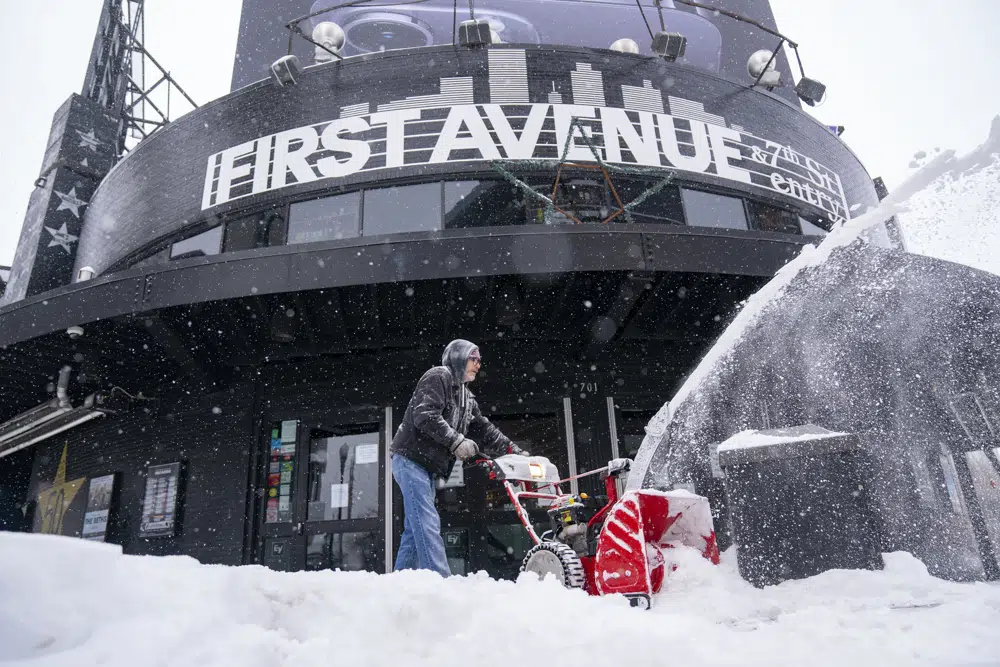Winter storms sow more chaos, shut down much of Portland

Portland, The Gulf Observer: Winter storms sowed more chaos across the U.S. on Thursday, shutting down much of Oregon’s largest city with almost a foot of snow and paralyzing travel from parts of the Pacific Coast all the way to the northern Plains.
The nearly 11 inches (28 centimeters) that fell in Portland amounted to the second snowiest day in the city’s history. It took drivers by surprise, stalling traffic during the Wednesday evening rush hour and trapping motorists on freeways for hours.
Some spent the night in their vehicles or abandoned them altogether as crews struggled to clear roads. Other commuters got off spun-out buses and walked in groups to safety. The National Weather Service, which had predicted only a slim chance of significant snow, planned to review its work.
The weather also knocked out power to almost a million homes and businesses in multiple states, closed schools and grounded or delayed thousands of flights. The system even brought snow to usually balmy Southern California.
High winds and heavy snow in the Cascade Mountains prevented search teams from reaching the bodies of three climbers killed over the weekend in an avalanche on Washington state’s Colchuck Peak.
Portland residents had expected no more than a dusting to a few inches. The city uses salt on its roads only in extreme situations for environmental reasons, and the chaos Thursday recalled a similar storm in 2017 that left motorists stranded on freeways and shut down the city for days.
The weather service originally predicted a 20% chance that Portland would get more than 2 inches (5 centimeters) of snow. The probability of getting 6 to 8 inches (15 to 20 centimeters) was only around 5%.
The forecast changed rapidly as the storm approached, said Colby Neuman, a weather service meteorologist in Portland. He said forecasters would try to figure out why their models were wrong.
“There’s a balance there between crying wolf and also informing people so they can make their own decisions,” Neuman said.
In Arizona, several interstates and other highways were closed due to high winds, falling temperatures and blowing snow. Forecasters said snow could fall as rapidly as 2 to 3 inches (5 to 8 centimeters) per hour.
A blizzard warning was in effect through Saturday in California for higher elevations of the Sierra Nevada, where predictions called for several feet of snow, 60 mph (96 kph) gusts and wind chills as low as minus 40 degrees (minus 40 Celsius).
Electrical grids took a beating in the north as heavy ice and strong winds toppled power lines. In California, lines were fouled with tree branches and other debris.
A Michigan firefighter died Wednesday after coming in contact with a downed power line in the village of Paw Paw, authorities said. Van Buren County Sheriff Dan Abbott called it a tragic accident that was “no fault of the firefighter.”
Widespread power outages were reported in California, Oregon, Illinois, Michigan and New York, according to the website PowerOutage.us.
The largest outages by far were in Michigan, where more than 820,000 customers were without electricity, mostly in the state’s southeast corner. Power lines and trees were shrouded in ice. DTE Energy said some outages could last through the weekend.
Afternoon temperatures in the 40s (above 4.4 Celsius) were expected to melt the ice, but DTE said it was bracing for more broken lines.
“A quarter-inch of ice on an electrical system is the equivalent of a baby grand piano hanging on those wires,” said Trevor Lauer, the president of DTE’s electric arm.
In the Detroit suburb of Dearborn, the city offered free dry ice, an acknowledgment that power could be out for a while. Ash Quam praised a public works crew for getting a large ice-coated tree limb out of the street.
“It was so loud when it came crashing down around midnight. By the time I woke up this morning, it was gone,” Quam said on Facebook.
Weather also contributed to another day of problems at the nation’s airports. By Thursday afternoon, more than 2,000 flights were canceled and nearly 14,000 were delayed across the country, according to the tracking service FlightAware.


